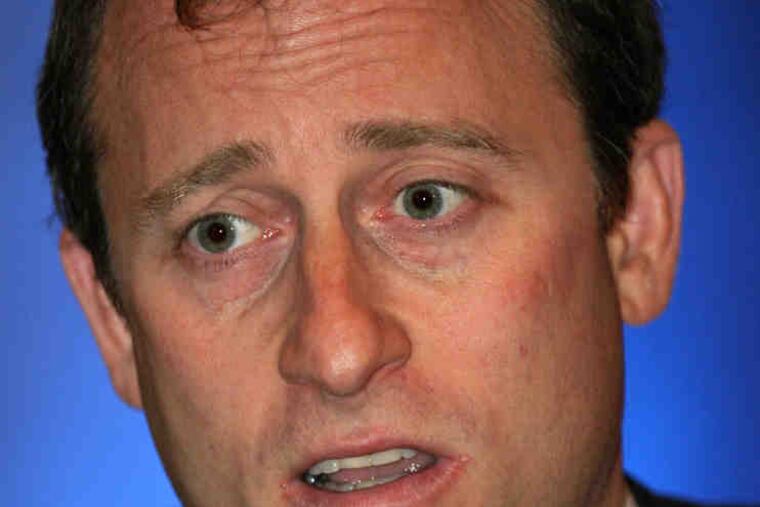A look into the bid to buy the Sixers
It could be a vanity purchase or a bargain buy - a high-priced bid to pose at any time with your very own professional sports franchise, or a shrewd play to scoop up a big-market team at a discount price, experts said.

It could be a vanity purchase or a bargain buy - a high-priced bid to pose at any time with your very own professional sports franchise, or a shrewd play to scoop up a big-market team at a discount price, experts said.
But while theories abounded Tuesday, the only thing abundantly clear as word spread of talks to sell the 76ers was this: The investors leading the group seeking to buy the NBA franchise from Ed Snider and Comcast-Spectacor were not talking.
Those two men are Joshua Harris and David S. Blitzer, graduates of the University of Pennsylvania's Wharton School who have become big figures in private-equity finance.
Harris cofounded New York-based Apollo Global Management L.L.C. in 1990. The company went public April 4, and its executives told investors last month that the firm had $70 billion in total assets under management, up from $56 billion a year earlier.
Harris is senior managing director of Apollo, which invests heavily in distressed properties, including real estate and the stranded assets of European banks, such as corporations, real estate, and consumer loans.
Before launching Apollo, he worked at the former Philadelphia firm Drexel Burnham Lambert. He remains active with Wharton as a member of its Undergraduate Executive Board. In Forbes' 2010 billionaire rankings, he was reported to have a net worth of $1.2 billion.
Blitzer created the London-based European office of the Blackstone Group, one of the largest private-investment groups in the world.
After joining Blackstone in 1991, Blitzer worked on several projects, including one that involved the massive shopping-mall real estate holdings of former Pittsburgh Penguins and San Francisco 49ers owner Edward DeBartolo Sr. and his family.
Blitzer was in charge of executing Blackstone's investments in Edward J. DeBartolo Corp. In 1994, the mall developer took his company public in a deal that, at the time, was to have converted $121 million in Blackstone debt into an 8 percent stake in the DeBartolo empire.
Today, Blitzer is senior managing director and cochair of Blackstone's private-equity group.
Messages left for Harris in New York (he was traveling overseas Tuesday) and for Blitzer at his Blackstone Group International Partners L.L.P. office in London were not returned.
Why would Harris, Blitzer, and an investor group that also includes former NBA player agent and Sacramento Kings executive Jason Levien want to buy the Sixers?
One perspective, shared Tuesday by Philadelphia private-equity partner Mitchell Hollin, of LLR Partners, was that any bid for a professional sports team ultimately has more to do with personal desire than financial returns.
Hollin, whose own time at Wharton overlapped with Harris and Blitzer's but who knows Harris only through mutual friends, said most sports-team deals cost more than the franchise is worth.
"Hopefully," Hollin said, "they make money. But at a minimum, they have fun managing that investment."
He said Apollo had "really made a very good track record of buying somewhat-underperforming assets and turning them around."
That does not necessarily mean that the firm would see similar "value" in taking on a team that has struggled with low attendance and a revolving door of coaches as play, until last season's hiring of Doug Collins as coach, lagged on the court.
An opposite view came from Kenneth L. Shropshire, director of the Wharton Sports Business Initiative.
He said it was entirely possible that, with NBA insiders worried about labor strife and a shutdown of the sport similar to the NFL lockout, that a weary owner would be looking to unload a team.
Knowing that, a bargain hunter might look to buy.
"If you're in search of troubled assets," Shropshire explained, "it's like going into Macy's and finding the item with a scratch on the leg of the chair, and you get the salesperson to give you a discount, and you figure you can take it home and fix that scratch, and no one will be the wiser, and you will get a deal."
One thing that reportedly helped sink earlier efforts to sell the Sixers was that Snider was not selling their home arena, plus lucrative concessions and other revenue generators, Shropshire said.
This time around, Snider again would reportedly keep the Wells Fargo Center, plus a slice of the team.
Financial wizards might project the cost of lost revenue corresponding to a thwarted season, factor in a recovery afterward - aided by the marquee value of a team like the Sixers - and find it worth their while to buy the team, but for a price low enough to justify the risk.
"Certainly, if you see labor strife in the future and you, for whatever reason, don't want to endure that with your team, here's an opportunity to sell," Shropshire said. "Or you can be approached by someone that says, 'I'm willing to take the risk, but I'll take the risk at a discount.' "
Former Gov. Ed Rendell, citing accounts from people "who are around the Sixers," said Tuesday that word had spread through the grapevine that Comcast-Spectacor "has been looking to sell the Sixers, if the right offer came along, for a while."
Apollo has interests in the Pennsylvania State Employees' Retirement System and the state Public School Employees' Retirement System. Its investments include the Curtis and Public Ledger buildings near Washington Square.
The firm also was briefly poised to become involved in the stalled Foxwoods casino in South Philadelphia in late 2010, a project that includes Snider as a major backer.